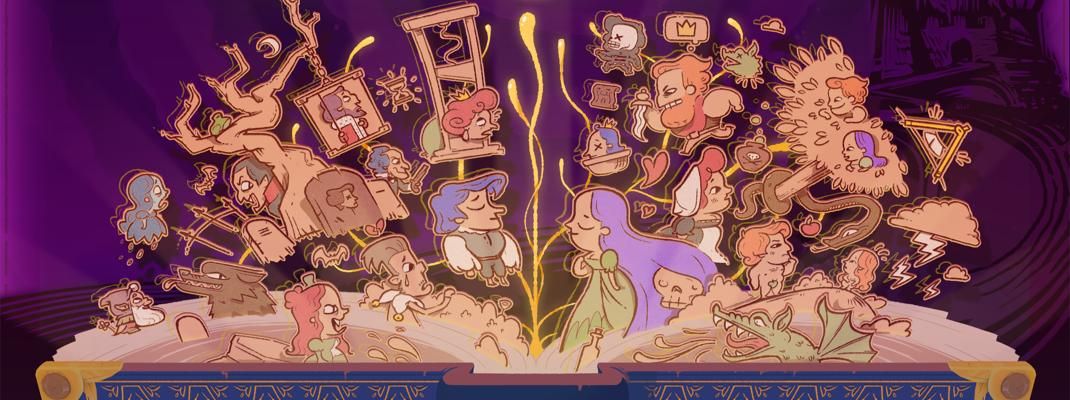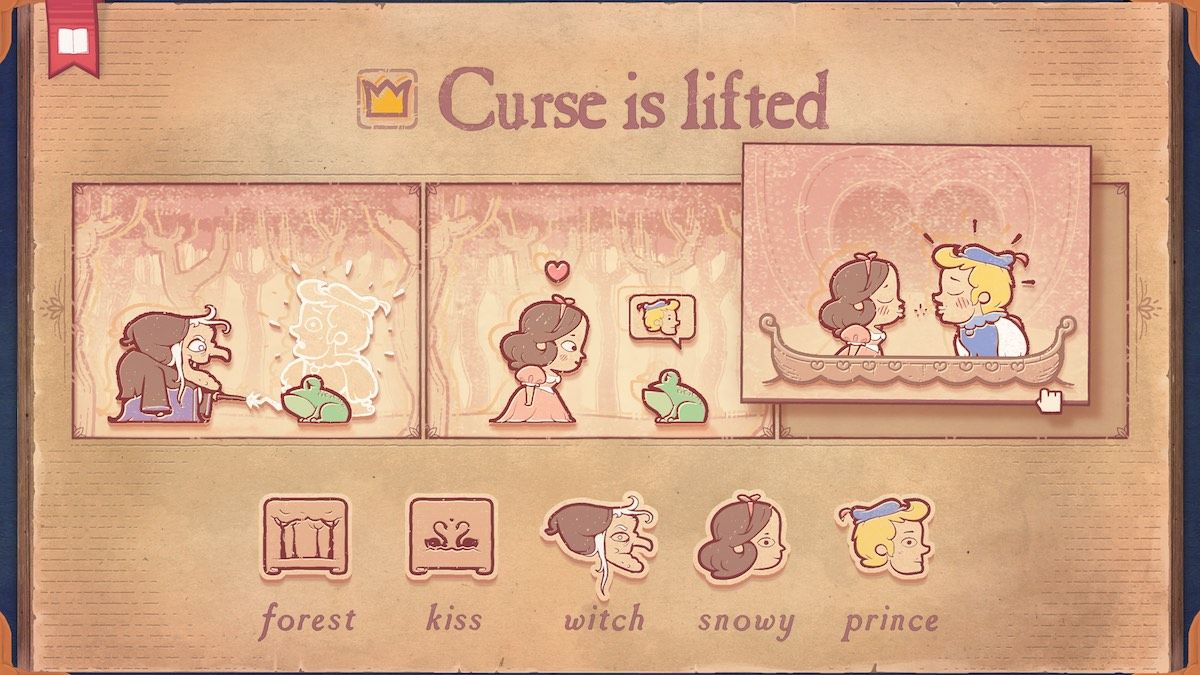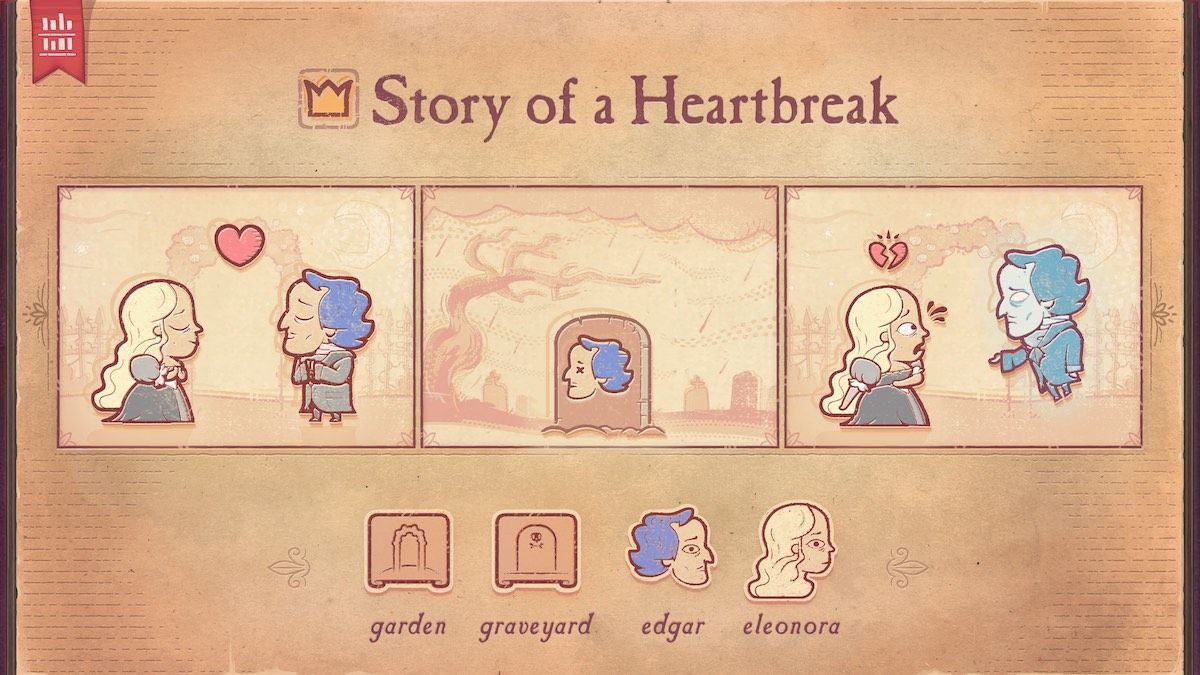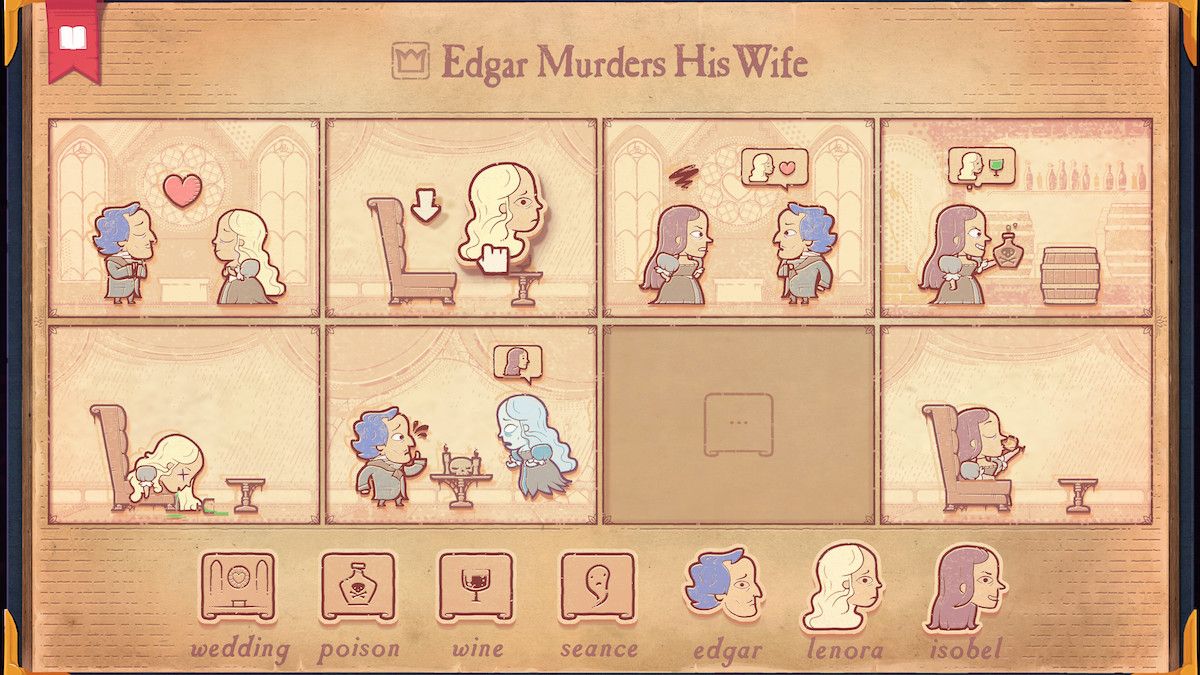Even the simplest, most basic of presentations can wind up the most satisfying to see to completion. Short-term elation may be at the heart of any and all good puzzle game, but what distinguishes a good puzzle game from the rest is in the construction of its own internal "rules" of sorts. Not just figuring it out, but seeing how these systems -- this other language of visuals, words and other such elements -- slot together, function and procure conundrums of varying, perceived difficulties. Storyteller is a wonderful case for arguing that one needn't construct a vast world or gripping tale to reach its inevitable end.
Developer Daniel Bermuigi latches onto this singular idea and runs with it. And while the surprisingly short (and perhaps a touch abrupt) length, to the point you could beat this in little more than a single sitting, does take away some of the lasting impact, there's merit to how quick and easy it is to understand the intentions pitted on the storyboard presentation and narrative premise-based mechanics. Whether or not you consider its short length a help or a hindrance will entirely depend on one's own personal judgment. Short doesn't always mean lesser in quality. Think back to a game like Gorogoa, itself a kind of storyboard-like construction of images requiring some deductive use of context and a dabbling with depth -- a game no more than a couple of hours long, but never prone to a dull moment in its use of imagery.
In the case of Storyteller, that playful attitude may be more static, but the charm of seeing context change and scenarios altered depending on which characters are placed where and what scenarios precede/succeed accompanying sections, still amounts to a good effort. The issue, as noted, isn't so much with the length -- or even the increasing difficulty/complexity added to in later chapters -- but rather the lack of much in the way of some surprising twist to help its storyboards leap from off their representative pages. If what you find in Storyteller isn't to your liking in the early chapters, it won't surprise you to learn that the exact same methods are imposed come the ninth/tenth/eleventh chapter thereafter.
For everyone else, Storyteller's best qualities are in its small steps. Slowly uncovering that hidden sequence of steps that lead to that prized outcome. Or in the case of the optional challenges that are peppered about certain levels, that lead to alternate outcomes or outcomes made possible without a particular aspect. The premise starts off simple enough: three panels, two characters, the story being that one character is grief-stricken at the other's death. From here you have certain scenes detailing things like a wedding, a shot of someone's gravestone and more. Place the profile of one character on a gravestone, with the other character standing beside it, nothing happens. A mere shrug from the one still alive, which is an obvious outcome. On that solitary scene alone, with nothing else taking place before that shot of the gravestone, there's no context to signify this is a lover stricken with grief. But precede said scene with a shot of the two getting married and before long, the sequence reveals itself.
The shortcomings might've been exasperated were it not, thankfully, for the way Storyteller broadens its canvas in later chapters. Not just in the case of extending the number of panels to place characters and scenes into, from three to six, but in the narratives the game tasks you with sequencing. And more importantly, the characters it introduces, features and reintroduces for later tales. Again, context is key when it comes to Storyteller and it's because the game manages to just about avoid falling victim to simply brute-forcing one's way, where its novel appeal seldom wanes. Granted you could theoretically keep swapping characters/scenes in and out until victory is achieved, but unlike something as binary as a multiple-choice question -- where the elements in play are either "right" or "wrong -- the elements in Storyteller can only be correct, if everything is correct. If one character is out of place, or one scene set too early or too late, the story can't be there to tell.
As something as simple-sounding as choosing the right tiles and panels to slot into place may be, Storyteller strikes a mostly-fair balance between directly and subtly telling the player what's possible and what's not. Some interactions -- in the case of characters being placed beside particular objects, or indeed pitted with other characters in the same panel -- don't always make immediate sense and it can lead to confusion as to why one character may not be compatible with another. Or more specifically, why the game deems it so. But the small-scale stature and self-contained manner of the puzzles means that even at its most seemingly vague and admittedly frustrating, such frustrations in Storyteller rarely last long enough to undermine what's still a smart use of minimalism to lead players down a multitude of potential avenues.
But beyond the labyrinth that is figuring out the required order of these puzzles, there's not much else to uncover in Storyteller beyond that aforementioned hunting down of alternate solutions to certain puzzles. While the lack of a grander meta to the overall nature, or how that may or may not influence proceedings beyond the reach of the pages to this fictional book taking focus, isn't entirely a deal-breaker, it's disappointing that the game doesn't evolve this competent, though satisfying, formula. Beyond simply increasing/decreasing the number of panels per puzzle and the ongoing suggestion that solutions needn't require you filling all of them to succeed. There's joy to be had here, but that joy is limited just as the premise demands some evolutionary step to truly take this into must-play territory.
Closing Comments:
For those more than happy with a brief game with a singular-though-solid concept at its heart, Storyteller serves up a pleasant, though far from extraordinary, take on the art of narration. A premise, though novel in its approach and easy to grasp from the word go, that sadly stops short of anything radical or surprising to help this leap off its figurative pages. Even so, a familiarity in presentation that lasts right through to the end, short and to-the-point its offers may be, there's a sufficient sense of delight to be found in the way Storyteller hones in on the allure of storytelling as a mechanic in of itself. Something that few puzzle games truly experiment with and apply from a gameplay standpoint, but one Storyteller, if nothing else, prides itself on and more importantly succeeds in showcasing.




